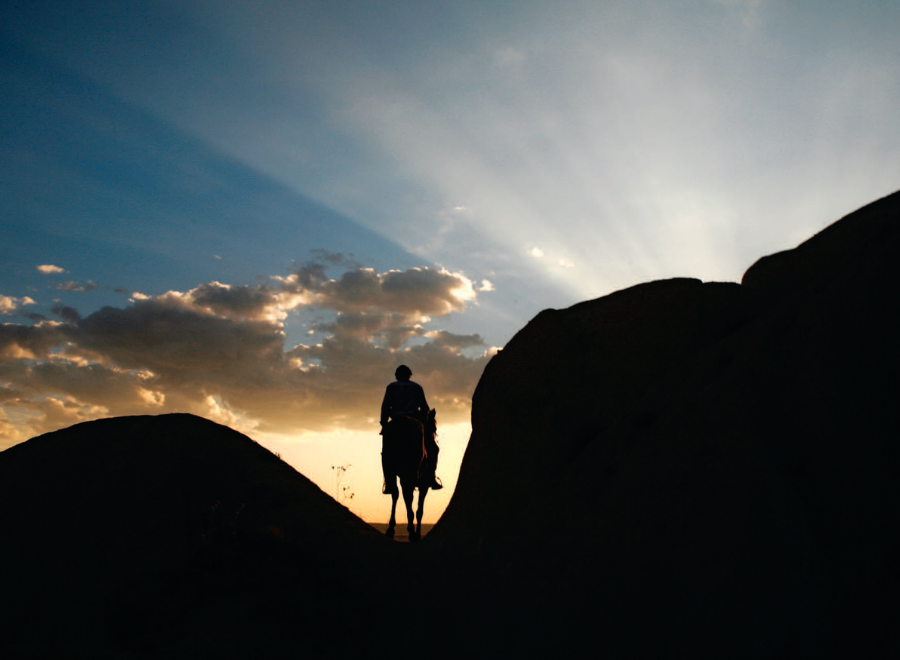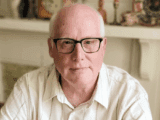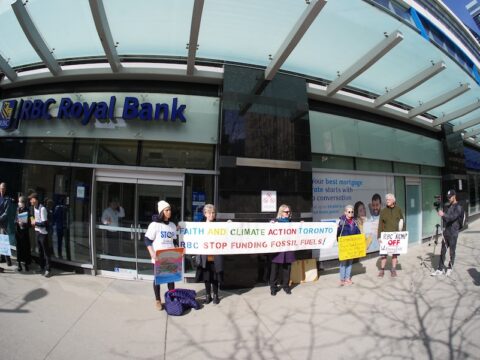Just before sunset last Easter Sunday, on a deserted beach on the north coast of Cyprus close to where the Apostle Paul docked almost two millennia ago, I experienced the most startling and powerful moment of my seven-week journey to trace his travels.
Suddenly, on the untouched rippled sand, I came upon a trail of footprints. I followed them up a great curving sand dune. And another. I became entranced by the elemental solitude of the place, its suspended timelessness. I began to feel I was being granted an uncanny moment of communion with the spirit of Paul. I looked up toward the slope ahead of me. And saw, cast against the sand, the shadow of Paul himself. He was in a long simple robe, his hand of biblical authority raised unquestioningly. It was electrifying. Especially when it struck me that the shadow was my own.
You may unsubscribe from any of our newsletters at any time.
Until this trip, I had not been really acquainted with Paul, had known only quotes from his letters and next to nothing about his life story. A 1974 book by Ernle Bradford called Paul the Traveller seduced me. It is a vivid narrative of Paul’s astonishing adventures, all sparked by a profound mystical experience — a vision of the risen Christ.
I felt compelled to go where he’d gone and see I might discover. So in the year the Vatican declared the 2,000th anniversary of Paul’s birth, I set forth on a journey through Turkey and Greece to trace Paul’s travels.
His journeys were so demanding and far-reaching, it’s hard to encompass them all. He undertook three epic missions over three decades in the late first century, covering thousands of miles on land and sea. He trudged up the Syrian coast and all over Turkey three times. He sailed to Cyprus, was shipwrecked on Malta, ferried up the Adriatic to Macedonia, trekked twice around Greece, sailed back to Jerusalem, journeying ultimately to Rome.
I wanted to know what drove him to such feats, to endure such trials. As he tells us in his second letter to the Corinthians: “I have been scourged, imprisoned, face to face with death. Three times I’ve been beaten by rods. Once I was stoned. Three times I’ve been shipwrecked and adrift on the open sea. I have been constantly on the road. I’ve met dangers from rivers, dangers from robbers, dangers from false friends. I have toiled and trudged and gone without sleep. Hungry and thirsty, I have suffered from cold and exposure.”
Tom Wright, Bishop of Durham, England, author of a dozen books on Paul, including What Saint Paul Really Said, calls him a “man of the roads.” Bishop Wright is one of a progressive group of current Pauline scholars keen to strip away the baggage they feel has accumulated around Paul over 2,000 years.
Paul never met Christ, but was born within a few years of him and took up his message like no other. Without his zeal, there would likely be no Christianity. Some have suggested our Christian faith should really be called Paulinity.
He spent years in jail, thrown there at various times in his travels by Roman authorities who viewed his mission as a treasonous threat to the empire. From prison, he wrote letters to the secret Christian communities he’d struggled to found — in towns like Corinth, Ephesus and Philipi. Those 13 letters form a significant segment of the New Testament. Unlike the four official Gospels written up to a century after Christ’s death, they date from only a few decades after the crucifixion and are an invaluable window into that time.
I travelled clutching Paul’s letters in one hand and John Dominic Crossan’s recent book, In Search of Paul, in the other. Crossan, a feisty member of the Jesus Seminar, intent on ferreting out the historical Paul, sees him as a formidable radical who took on the Roman Empire and its hierarchy, power and peace achieved through war. He challenged the divine authority of the emperor himself, ultimately paying for it with his life.
From Turkey’s Mediterranean coast, I drove north toward Paul’s birthplace, up a steep, twisting mountainous road with great crags and chasms on either side, and a dark river churning far below. Along that river can still be found fragments of a Roman road Paul walked. From my easy vantage point in a car, I was staggered by the stamina he must have had.
Paul was originally a Jew, a Pharisee born in the town of Tarsus. The modern-day city in Turkey’s central interior is a bustling place, where remnants of its Roman past have recently been revealed. A local guide pointed out crumbling stone foundations he claimed were the ruins of Paul’s house. The notion put a smile on my face — it’s impossible to know such specific details about Paul’s past. But when I was steered toward an unearthed section of Roman road and stepped onto the tightly fitted blocks of stone, I felt strangely giddy with the sensation that Paul could well have walked right here.
Back then he was called Saul. As a youth, his prodigious intellect took him to Jerusalem to pursue rabbinical studies. Keenly sensitive, he couldn’t fail to note that the temple stood in the shadow of a huge Roman fort. Jerusalem was under the strong arm of the empire. At the temple, Saul was devoted to a strict school of Phariseeism as taught by the Jewish scholar Shammai. It spurred in him a fervent faith in the coming of the promised messiah and a zealous persecution of those who stood in the way of that coming.
A small ardent band of Jews were heralding a man who they believed was the messiah — Jesus of Nazareth, who’d recently been crucified by the Romans in Jerusalem. Saul may well have witnessed the crucifixion, a commonplace event in the brutal reality of the Roman-occupied city. He immediately rejected the faith of this group of Jews, and set out to punish them for it. How could such a man be a messiah?
—
On a lonely stretch of stony road near Turkey’s border with Syria, I got out of the car to stretch my legs. A herd of goats foraged for what little green they could find on the bleak bare hills. I walked along in total solitude and thought it must have been on a road like this that Paul made his way to Damascus that pivotal day so long ago. The day that changed him utterly, that would eventually change the world.
“God called me through his grace. He chose to reveal his Son in me. He appeared, even to me. It was like an untimely birth.” That is all Paul says in his letters about what happened to him. In the New Testament’s Acts of the Apostles, a book written decades after Paul’s time by a man called Luke, we learn that Paul had an ecstatic experience of white light all around him, out of which came a voice asking, “Why do you persecute me? . . . I am Jesus, whom you are persecuting.”
Paul was shaken to the core. He believed he’d seen the risen Christ, the man whose followers he’d been hounding. He now had faith that this was the messiah he’d been longing for.
We tend to think his conversion on the road to Damascus meant that his new perspective on the world and his role in it was as clear and immediate as the flash of illumination he’d experienced. It was far more complex than that. His world had been turned upside down, his former perceptions shattered and a host of difficult questions unleashed. Most critical was why God would choose to resurrect a man crucified by the Romans as a common criminal. In order to sort it all out, he went away for 14 years. We don’t know where. It could well be he joined one of the first secret groups of Jesus followers, to learn and live what Christ meant for them.
Paul’s ineffable experience became a beacon on my journey with him. I imagined him contemplating the impossible mystery of Christ transcending death on the cross. The more I empathized with Paul, the more I could feel him empathizing with Christ, bringing him mystically within, almost touching the rough splintered wood of the cross itself and sparking in him a new perception of a Roman system riddled with social injustice, hierarchy and enslavement. Juxtaposing this grim world with the glorious contradiction of the risen Christ, he began to see the cross not as a symbol of death, but extraordinary new life. His vision was revolutionary. One quintessential line in his letter to the Romans captures it: “Death is swallowed up in victory!”
For Paul, the miraculous victory of Christ’s rising from a brutal Roman death became a subversive victory over the whole pervasive grip of Roman power. This was what fuelled his mission to liberate hundreds of thousands under the yoke of that power and replace the yoke with a new society of peaceful equality. Each new community he initiated would become a body of Christ, where “There is no such thing as Jew and Greek, slave and freeman, male and female. You are all one in Christ.”
I began to see that Paul’s ability to live within Christ, to excite those whom he met on the road with that possibility, and perhaps more than anything, to feel Christ with him always as he faced constant trials, was the thing that kept him going against all odds.
—
On my journey to track traces of his many struggles, there were three moments that moved me deeply.
The first was searching southwest of Tarsus for the ruins of the town of Lystra where Paul had his first brush with death. After some time driving, I came upon a green field at the edge of a village. In the bright sunshine, lambs were gambolling among the scattered fragments of fallen columns, watched over by a stout and weathered shepherdess. I realized this could well be the same place where Paul and his companion Barnabus had proclaimed their good news with such conviction that the gentiles of the town decided they were the gods Jupiter and Mercury. When Paul became furious with their misconception, the crowd returned the fury and began hurling stones at the two men. I stood transfixed by the vision of this nightmare, rocks raining down on them, in this field where lambs jump for joy. Barnabus escaped. But Paul was left for dead. We don’t know who rescued him. He healed and continued his mission.
The second remarkable moment happened while walking the Roman road into the dramatic ruins of the city of Ephesus on Turkey’s Adriatic coast. With a marvellous panorama of temples and a remarkably intact giant amphitheatre before us, the guide directed my gaze to something carved on the stone right at our feet — strange graffiti, like small wheels with eight spokes. He decoded this secret symbol, tracing its lines to spell out the Greek word iktus meaning “fish,” and explained this sign was scratched to alert early followers of Jesus that fellow “fish” could be found here. Worshipping Christ was a risky business, and making this sign was subversive, dangerous. I stared at it, finding something compellingly intimate in imagining the moment it was carved so long ago. Maybe it was after dark when Roman soldiers patrolling might be less likely to notice a man in the shadows. It was here that Paul himself got into deep trouble.
According to the Book of Acts, Paul’s preaching triggered a riot of thousands. He was hounded into the amphitheatre and ended up in jail, where he feared for his life.
I wanted to commune in some way with Paul’s circumstance. Down a dark passage from a wing of the vast amphitheatre, I came upon a barred cell. Through a crack in the wall came a single beam of sunlight, fragmenting into colours like a prism. I could imagine Paul sitting there, his tough wiry form bowed over as he pondered the prospect of death. The beam of light grazed his shoulder. He could feel Christ there with him and in him. He wrote a letter to the secret community of Philippians he’d founded in Greece.
“The Spirit of Christ is given me for support. My earnest hope is that Christ shall be magnified in my body, whether by life or by death. For to me life is Christ, and death gain. Christ made himself nothing, became like a slave. He humbled himself and accepted even death on a cross. Then God raised him to the heights, so that at the name of Jesus every knee should bow.”
Paul spent three years in jail at Ephesus, and was ultimately released. He continued journeying for another decade, revisiting communities, strengthening their faith, democratic ideals and courage to withstand persecution.
“Show yourselves blameless and above reproach, children of God in a warped and crooked nation, in which you shine like stars in a dark world. Everyone who has faith in Him shall be saved. Let us throw off the deeds of darkness and put on armour of light.”
“Armour of light” struck me as an extraordinary metaphor for living a full, true, compassionate life, in a manner that’s both protected and transparent. It’s a lofty goal worth fighting for — and in Paul’s case, dying for.
It was inevitable that his radical teachings would bring his end. In Rome, in AD 64 and in the aftermath of the Great Fire and the nightmarish persecution of early Christians who were blamed for it, the Emperor Nero had Paul imprisoned and beheaded.
The last, indelible moment came near the end of my travels. It gathered up in one divine image the passion, strength and lasting legacy of Paul’s life. On the shore of the Adriatic Sea, near the ruins of the wharf where Paul sailed to his fate, a wild poppy swayed delicately in the breeze. It was so seemingly fragile, yet so sturdy; its colour so intense, so full of life — crimson as blood.
“There are three things that last forever: faith, hope and love. But the greatest of them all is love. Without love I am nothing.”
Paul’s wisdom will always be with me.
***
This story first appeared in The United Church Observer’s March 2009 issue with the title “In the footsteps of Paul.”
Cindy Bisaillon is a Toronto writer, poet, filmmaker and radio broadcaster. Her spiritual journeys over several decades form the core of her work. Her two-hour documentary on Paul, The Man of the Roads, aired recently on CBC Radio’s Ideas.













